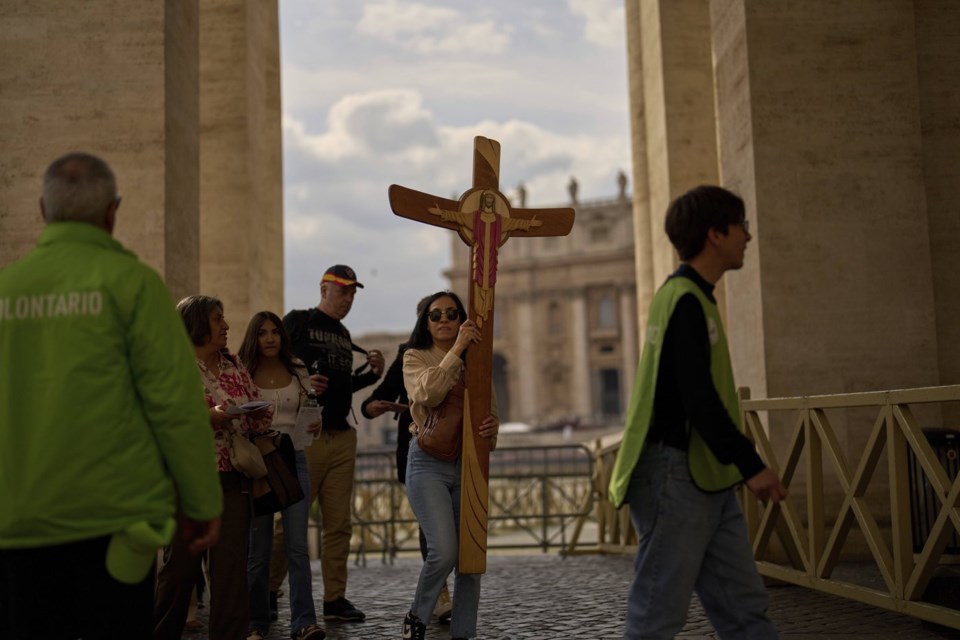LONDON (AP) — Friday marks three weeks since was hospitalized for bronchitis, which then led to double pneumonia. He was also treated for a and has suffered several respiratory crises requiring further treatment, including machines to help him breathe.
Doctors not involved in the pope’s care say the road ahead could be tricky, even if the 88-year-old pope fully recovers. Here’s a look at the pope’s hospitalization and what doctors will be watching out for in the days and weeks ahead.
Why was Pope Francis hospitalized in the first place?
The pope was hospitalized Feb. 14 after suffering from weeks of bronchitis that made it increasingly hard for him to speak. Several days later, Vatican authorities said he had a complex infection in his respiratory system requiring more targeted treatment.
The pope then developed in both lungs and began receiving steroid and antibiotics, among other treatments.
How bad is this?
“He’s an 88-year-old who’s been in the hospital and receiving acute care for three weeks,” said Dr. Andrew Chadwick, a respiratory and intensive care specialist at Oxford University Hospitals in Britain. “That’s not a sign that things are going well.”
Chadwick said that any admission of someone in Francis’ age group, for this long, is very concerning. “The road ahead still looks bumpy,” he said.
Francis' doctors have said he is in stable condition, but that his prognosis is guarded, meaning he is not out of danger.
What are doctors particularly worried about?
The number of , complications and the pope’s reliance on machines to help him breathe suggest that “the pneumonia is more severe and is requiring more intensive supporting measures,” said Dr. Meredith McCormack, director of pulmonary and critical care medicine at Johns Hopkins University.
“It sounds like there might not be signs of clear improvement and some continued signs of severe infection, like continuing to need oxygen,” McCormack said.
Vatican authorities said the pope's last respiratory crisis was on Monday and things have stabilized since then.
Others doctors noted that the longer Francis is in the hospital, the more susceptible he is to other complications, like infections from catheters, bed sores, or another bout of pneumonia.
Are there any encouraging signs that the pope might be getting better?
Dr. Jeffrey Millstein, a clinical assistant professor of internal medicine at the University of Pennsylvania, said it was good that Francis hasn’t needed a mechanical ventilator. That would be the probable next step if he wasn’t able to breathe well enough with the non-invasive support he's gotten so far.
On Friday, the Vatican released a short audio clip of the for their good wishes. Even though the pope’s voice sounded markedly weaker than normal, McCormack said that was a welcome sign.
“That does show he’s still able to communicate in a meaningful way,” she said. “If you were on life support … you wouldn’t be able to do that.”
How long might recovery take?
Quite a while. McCormack said that for every week a person spends in the hospital, it can take about a month of recovery time.
Dr. Eric Schmidt, division chief of pulmonary and critical care medicine at Massachussetts General Hospital, said that severe pneumonia can have lasting consequences.
“It is not simply a disease of the lungs. It really impacts multiple parts of the body,” he said, explaining that people who have severe pneumonia can later suffer from problems including memory loss, an inability to focus, muscle weakness and depression.
Chadwick of Oxford University Hospitals said experts would be hoping to see the pope move from being acutely sick into receiving rehabilitation therapy.
As of this week, Francis has been receiving physical therapy to help his mobility, on top of the respiratory physiotherapy he had been receiving to help him breathe better.
“Even if he were today to get miraculously better, he's likely to need a prolonged period of rehab,” Chadwick said. “The pope will likely have to relax for a while and scale back some of his normal duties.”
___
Nicole Winfield in Rome contributed to this report.
___
The Associated Press Health and Science Department receives support from the Howard Hughes Medical Institute’s Science and Educational Media Group and the Robert Wood Johnson Foundation. The AP is solely responsible for all content.
Maria Cheng, The Associated Press




